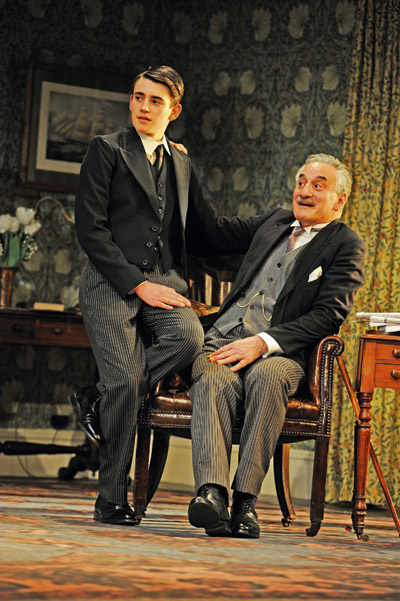Impossible, surely. The Book of Mormon could never live up to the accolades lavished on it by America’s critics. ‘Blissfully original, outspoken, irreverent and hilarious,’ was a typical review. The three authors are formidably gifted. Trey Parker and Matt Stone gave us South Park, while Robert Lopez is the co-writer of Avenue Q. As a fan of both shows, I was fearful that Mormon would turn out to be as much fun as underwater paintballing.
So, up goes the curtain. A posse of geeky Yanks in crisp white shirts are being dispatched to Mormon missions around the world. We focus on two characters, a big handsome jock and a fat needy blob. Their destination is revealed: Uganda. Everyone is shocked and sad. They reach Africa — a CNN version of the Third World — which heaves with squalor and creepy-crawlies but hasn’t the slightest trace of religious culture. Odd that. Never mind. At the local Mormon mission, our characters sing songs that gently mock their faith and allude to rumours that some Mormons might be gay. The Africans also sings songs about their best-known shortcomings. This establishes the show’s motifs. Believers make jokes about the silliness of belief. Africans make jokes about the silliness of Africa. Both groups are portrayed as charming simpletons although the Africans are blessed with a strain of knowing cynicism that the Mormons lack. The audience, too, is expected to share their worldly sophistication. So when the Africans sing, ‘eighty per cent of us have Aids’, the audience feels safe tittering at the disease because it’s the diseased who began tittering first. Fair enough.
Then a swaggering African lout announces that he’ll cure himself by raping a baby girl. Which doesn’t get a laugh. Any taboo can be made funny, in theory — even baby rape. But the authors haven’t discovered the right theory to apply. The line is repeated later. Again no one laughs. It just sits there, like a smell. In act two, there’s an afterlife sketch that features Hitler enjoying sex (a scene the Waffen SS would have approved of).
The show ends with some dull friendships being solidified and all the Africans converting to the faith. If you substituted Coca-Cola or Ford Motors for the Mormons’ brand of evangelism you’d unlock the key to this muddled, infantile pantomime. It’s a corporate advert for American cultural supremacism which, in its knowing and cynical way, it slyly endorses while claiming to subvert. The Book of Mormon isn’t a comedy. It’s a mystery. How did anyone find it entertaining? Toothless, jokeless, plotless and pointless.
Thank God for The Winslow Boy. Terence Rattigan’s masterpiece begins as an Edwardian comedy of manners. A nervous young subaltern, engaged to Catherine Winslow, is being quizzed by her father, Arthur, a stern and exacting financier. Off-stage, Catherine and her mother wait in the wings, eavesdropping. It’s a brilliant scene — tense, unpredictable and extremely funny, and written with a rich understanding of the characters’ motives and foibles.
But scandal is about to overwhelm the upright Winslows. Their youngest, Ronnie, a 14-year-old naval cadet, has been dismissed from the service after being accused of stealing five shillings. Arthur, believing in Ronnie’s innocence, hires the most brilliant and expensive barrister in England. The family’s fortunes are perilously balanced between ruin and triumph. But the barrister, Sir Robert Morton, first wants to test the mettle of the defendant. He treats the quivering Ronnie to a brutal cross-examination in the family sitting-room, but he fails to elicit a confession of guilt. The twist that follows this whirlwind of rhetoric is regarded as one of the most brilliant surprises in the entire repertoire of dramatic art. And it’s delivered here in blistering style by Peter Sullivan (Sir Robert), who specialises in cold, devious, arrogant swines whose honour and humanity lie buried deep within their character. By the play’s end, he has emerged as an unexpected hero and champion of justice.
Director Lindsay Posner harvests a bagful of great performances from his cast. Wendy Nottingham, as the dim, sweet-natured maid, delivers an expert piece of lowbrow comedy. Naomi Frederick captures the chilly decency of Catherine Winslow, the family’s suffragette-in-residence. And Henry Goodman, a mesmerising Arthur, is able to shift in a few seconds from sardonic waggery to a more exalted note of affronted grandeur.
Let’s not forget the script which, line by line and beat by beat, is an absolute miracle of dramatic craftsmanship. Not the least of Rattigan’s achievements is to take the full span of a long-running and multilayered court case and to condense the significant details into conversations conducted in a family sitting-room. Astonishing. With The Judas Kiss due to close, this show takes its place as the best play in London.







Comments